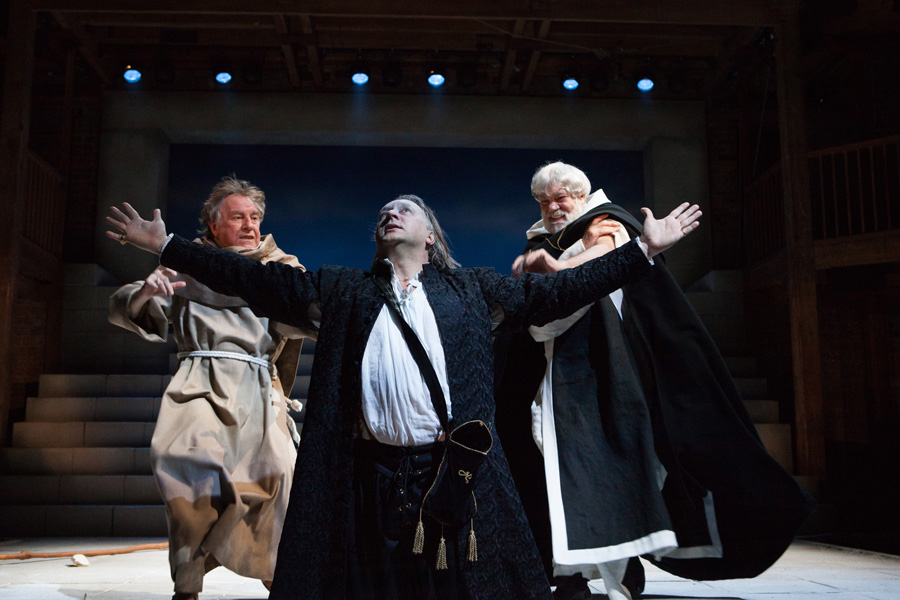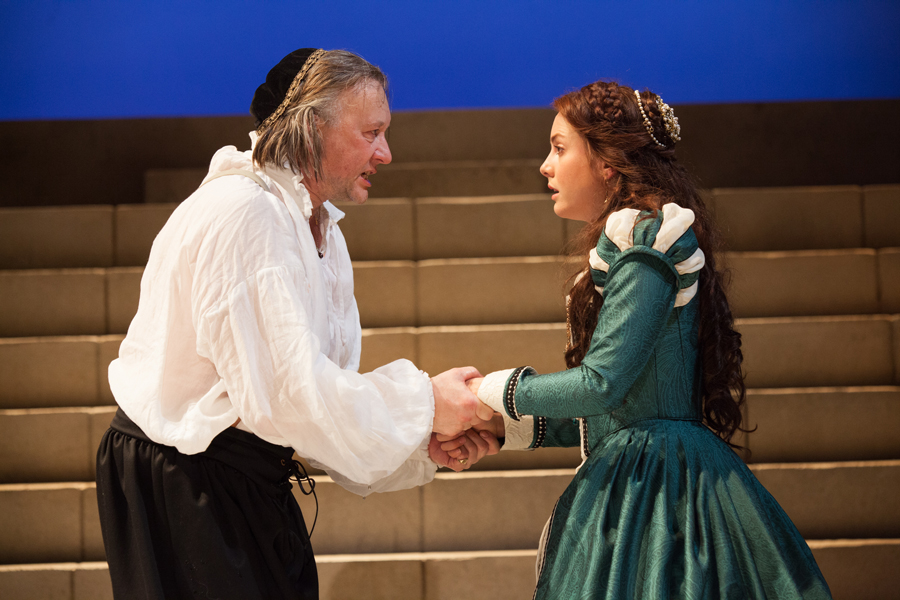 Ben Jonson’s scabrously and cruelly comic take on greed premiered to huge acclaim in 1605, the year of the Gunpowder Plot, and has remained his most popular play. Although it shares its exotic (especially in Jacobean England) Venice setting with two other plays in the current Royal Shakespeare Company season – The Merchant of Venice and Othello – the RSC is actually pairing it with Christopher Marlowe’s The Jew of Malta (and a lesser known play, John Ford’s Love’s Sacrifice) calling them "contemporary takes on classic plays exploring the idea of the outsider".
Ben Jonson’s scabrously and cruelly comic take on greed premiered to huge acclaim in 1605, the year of the Gunpowder Plot, and has remained his most popular play. Although it shares its exotic (especially in Jacobean England) Venice setting with two other plays in the current Royal Shakespeare Company season – The Merchant of Venice and Othello – the RSC is actually pairing it with Christopher Marlowe’s The Jew of Malta (and a lesser known play, John Ford’s Love’s Sacrifice) calling them "contemporary takes on classic plays exploring the idea of the outsider".
Of course the RSC is also reviving The Merchant of Venice this season (which we reviewed), which could also be considered a classic exploring the idea of the outsider, as Shylock, though not the title role as in Volpone and The Jew of Malta, is considered such a central character.
It is perhaps a relief that Jonson didn’t choose to cast his title character in this study of greed, the supremely greedy Volpone, as a Jew. His ruthless schemes to acquire more wealth and precious objects are based around his brilliant masquerade as a childless invalid on his deathbed seeking an heir to whom to leave his wealth. And they are, if anything, more ingenious than Barabas’s machinations in Marlowe’s play and like Barabas, he starts the play by taking the audience into his confidence. But Volpone is the wily fox not the wily Jew and pretty well everyone else in the play is as greedy and morally bankrupt as he is. Plus most of the other characters also have Italian names that flag up their types to the audience straightaway – like the greedy would-be heir, Corvino, the Crow and Mosca, Volpone’s assistant and partner in crime, The Fly.
More than 15 years ago, Henry Goodman played Shylock at the National Theatre, in a production of The Merchant of Venice by Trevor Nunn. I am not alone in considering Goodman’s Shylock to be the finest, the most complex, the most moving that I have ever seen. Now he is reunited with Nunn and actor and director find themselves back in Venice, once again in a modern dress production of a classic dark comedy. This time though, instead of playing a man who is an outsider cast in that role by his fellow citizens because of his race and religion, Goodman plays a man who is supremely comfortable in his skin. He’s positively gleeful in the Machiavellian masquerade that means he can never be himself with anyone except the circle of minions who are in his pay and in his confidence, Mosca his private secretary, and his dwarf, his eunuch and his hermaphrodite. But then his very best friends are his golden treasures and he simply can’t get enough of them.
Like his earlier Shylock, this is a stellar performance by an actor at the height of his powers, working wonderfully with the director with whom he goes back such a long way. Goodman’s is a marvellously warm stage presence, with a vigorous energy and an irresistible twinkle in his eye, even if it is perhaps the glint of avarice. When he takes the audience into his confidence at the start of the play, it’s quite hard not to be bowled over by all that enthusiasm – and not to be impressed by the close tabs he keeps on the stock market, with an LED display of share prices constantly updating above his head – courtesy of Stephen Brimson Lewis. The British set designer has a spectacular sense of how to use the Swan Theatre’s roomy thrust stage with light and airy glass display cases containing the treasures and vital props and scenery, like Volpone’s sickbed, complete with drips and heart monitor, arriving smoothly and swiftly on stage as needed.
Goodman’s transformation, with the aid of his staff, from, frankly, a rather sexy millionaire clad in designer silk pyjamas and dressing gown into a pathetic, dying invalid "sans eyes, sans teeth, sans everything" is masterly – a fantastic and very funny coup de theatre.
As in The Jew of Malta, it’s hard to feel any sympathy for most of these greedy types. It’s also great to see so many members of The Jew of Malta playing almost parallel roles here. So Matthew Kelly and Geoffrey Freshwater, who played a pair of greedy clerics in Marlowe’s play, here get to play a pair of equally greedy clients and would-be heirs of Volpone. They are so unscrupulous that the one is not above prostituting his own wife when it’s implied that would further his chances to inherit and the other is prepared to disinherit his son for the same reason. Both men seem physically crooked and diminished by their lust for riches, while Volpone and his acolyte Mosca (a performance of terrifically sly and energetic intelligence from Orion Lee) seem rather invigorated by theirs.
Steven Pacy, the pusillanimous Governor of Malta, enjoys a great comic turn as the preposterous gentleman traveller in Venice, Sir Politic Would-Be, whose name speaks for himself. He is more than matched by his vacuous wife, the superbly brassy Annette McLaughlin, who's all big hair and extensions, tiny tight frocks and dizzyingly high heels, channelling Kim Kardashian and TV Reality show The Only Way is Essex followed by her long-suffering personal cameraman and girl assistants at all times. So no pearl of wisdom, no handy make up tip is lost to her Youtube followers; and with selfie stick at the ready so no photo opportunity is lost either. Again great use is made of huge onstage screens blowing Lady P up to a lot more than life-size (video designer Nina Dunn). Colin Ryan is great fun as Sir Politick’s nemesis, Peregrine (or ‘pilgrim’), a much more savvy, young American backpacker, complete with dreadlocks and iPad.
Nunn and his creative team work seamlessly and wondrously together to build a production so fluid and so intelligent and so right for this time of social media and self-publicising, intrusive media scrutiny – and unbridled corporate and individual greed and inequality – that it’s hard to see how it could be bettered. There is a breath-taking moment when Volpone realises his deceptions are catching up with him. The bustling action of the court to which the invalid has been called to testify freezes around Volpone and his household, who are thrown into sharp monochrome relief by Tim Mitchell’s masterly lighting. It’s a real moment of truth and as fine as any I can remember from any of Nunn’s extraordinary body of work.
The whole is fabulously enhanced by Steven Edis’s gloriously appropriate music, directed by John Woolf on keyboards, with Andrew Stone-Fewings (trumpet), Andrew Waterson (guitar) and Kevin Waterman (percussion). In particular a speech about Pythagoras’s potentially problematical theory of the migration of souls becomes a bravura rap performed by Jon Key’s Nano the dwarf, Ankur Bahl’s Androgyno the hermaphrodite (a sexy Eurovision winner Conchita Wurst lookalike) and Julian Hoult’s Castrone the eunuch – all lovely movers! And I should finish by paying tribute to Ranjit Bolt’s sparkling script revisions which are spot on. This really is a must see.
By Judi Herman
Photography © Manuel Harlan
Volpone runs until Saturday 12 September. 7.30pm & 1.30pm. £8-£40. Swan Theatre, CV37 7LS; 084 4800 1110. www.rsc.org.uk





